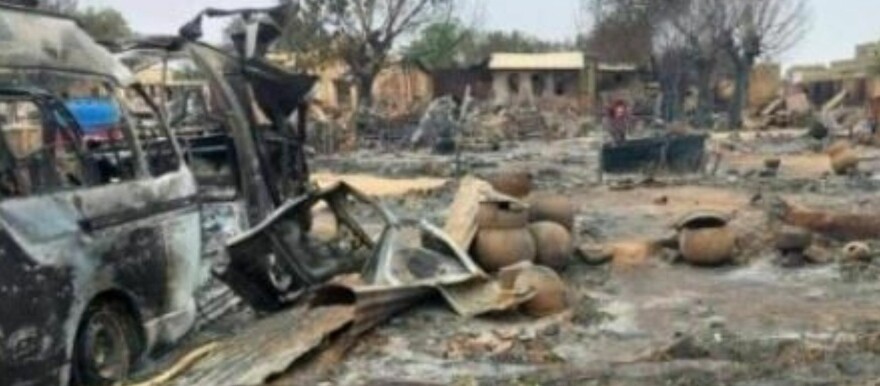The United States government’s announcement on December 6, 2023, that atrocity crimes have been committed by both warring parties in Sudan should be followed up by robust action to halt abuses and ensure accountability, Human Rights Watch (HRW) said on Monday.
The US announced that war crimes and crimes against humanity had taken place over the last eight months of conflict in Sudan. In a statement, US Secretary of State Antony Blinken said that both the Sudanese Armed Forces (SAF) and the Rapid Support Forces (RSF) have perpetrated war crimes. Secretary Blinken said that the RSF and allied militias are also responsible for crimes against humanity and ethnic cleansing.
“The US determination of the atrocity crimes unfolding in Sudan sends an important message to the victims that their suffering is known,” said Nicole Widdersheim, the deputy Washington director at Human Rights Watch. “But for it to serve as a deterrent to further abuses and help safeguard civilians, it needs to be accompanied by a change of US government policy and concrete measures.”
Fighting in Sudan’s capital, Khartoum, between the SAF and the RSF broke out on April 15, 2023, rapidly spreading throughout the country. Warring parties have committed indiscriminate attacks on civilians, destroyed essential infrastructure, and blocked aid access. Since the beginning of the conflict, at least 12,190 people have been killed and 6.6 million people have been displaced. In West Darfur, the RSF and its allied militias have targeted non-Arab civilians, notably Massalit community members, in ethnically motivated killings and carried out widespread pillage, arson, and sexual violence.
In his statement, Secretary Blinken said: “In haunting echoes of the genocide that began almost 20 years ago in Darfur, we have seen an explosion of targeted violence against some of the same survivors’ communities. Masalit civilians have been hunted down and left for dead in the streets, their homes set on fire, and told that there is no place in Sudan for them.”
Despite the gravity of the situation on the ground and the US government’s announcement that it has identified serious violations of international humanitarian law in Sudan, Secretary Blinken did not announce any action. Instead, the statement merely ended by noting that the US “is committed to building on this determination and using available tools to end this conflict and cease committing the atrocities and other abuses.”
Acknowledging such serious violations of international humanitarian law should be accompanied with specific actions to ensure those responsible are held to account and that the world acts to protect civilians in Sudan, Human Rights Watch said.
“The US should start by initiating robust consultations to explore the viability of alternatives for protecting civilians alongside the United Nations, African Union, and Intergovernmental Authority on Development (IGAD), which have not been able to provide adequate protection,” the HRW statement read in part. “The US should also impose additional sanctions on individuals against whom there is credible and sufficient evidence that they are responsible for serious crimes.”
According to HRW, the US government should also ensure that key civilian voices, including those of displaced communities, human rights and women’s rights defenders, and other pro-democracy forces are represented in ongoing or upcoming discussions. It should increase funding for Sudanese rights and civil society organizations and designate refugees from Darfur, or subsets of refugees from Darfur such as victims of atrocity crimes and human rights defenders, as a “group of special concern” that identifies them as refugees in need of resettlement by their shared characteristics.
“The US response in Darfur 20 years ago, although imperfect, had taken much clearer steps to halt abuses unfolding at the time. In September 2004, then-US President George W. Bush announced that the State Department had come to the conclusion that genocide was being committed in Darfur, accusing the Janjaweed militias that preceded the RSF of committing atrocities against the people of Darfur and the Sudanese government of not doing enough to end the violence.” The statement stated. “The UN Security Council, of which the United States is a permanent member, subsequently took action, including in a March 2005 vote to refer the situation in Darfur to the International Criminal Court (ICC). The United States abstained on the vote enabling the referral to go through.”
Since May 2023, the US State Department has focused on a mediation process in Jeddah, Saudi Arabia, with representatives of the two warring parties, a process that has neither shown any genuine focus on civilian protection nor on accountability for atrocities, far less leading to any concrete end to cycles of abuse. At the Security Council, the US has repeatedly voiced alarm at massacres in Darfur in recent months but has not managed to transform that concern into concrete outcomes that could help protect Sudanese civilians.
Previous US government determinations that atrocities were being committed in Iraq, Burma, and China have been accompanied by some shifts in US policy, new allocations of resources, and increased efforts to support justice mechanisms. The Biden administration at a minimum should be considering new policies and program decisions concerning Sudan, Human Rights Watch said.
The rights body insists that following the Sudan atrocity determination, the US government should express strong backing for the ICC Office of the Prosecutor’s investigation of recent crimes committed in Darfur, which ICC Prosecutor Karim Khan announced in July, and engage with Khan on how the US can best support the ICC’s effective prosecution of those implicated in the most serious recent crimes committed.
“The US government knows the magnitude of what is unfolding before its eyes, and should not choose to look away,” Widdersheim said. “It can start by rallying support for accountability efforts, including by the International Criminal Court, and working to fill the existing vacuum in civilian protection in Darfur.”




